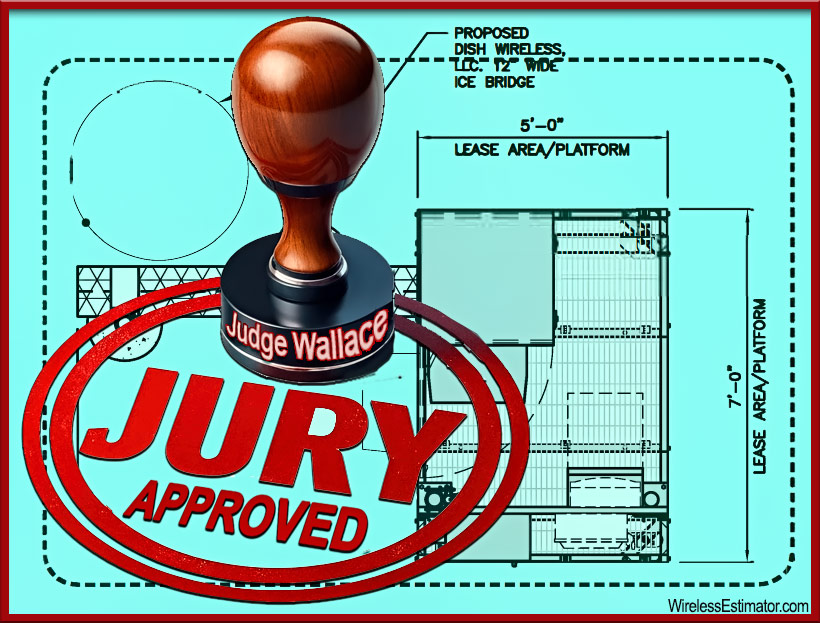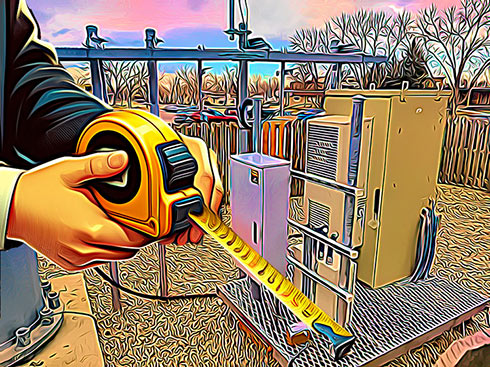
A Colorado jury’s verdict disagreed with Crown Castle’s attempt at trying to get $8 million a year for an additional three feet of space that they claim Dish Wireless encroached upon in thousands of their site compounds.
A jury last Thursday found Crown Castle USA Inc. failed to prove Dish Wireless Inc. violated the parties’ 30-year master lease agreement (MLA) by taking up three extra feet of space on cell tower sites without paying an additional rent of approximately $8 million per year.
Crown Castle said Dish owed $200 more monthly rent for approximately 3,339 sites. With a 2% annual increase, the MLA is for 30 years. Had Dish lost, it would have cost the carrier an additional $325 million during the lease period.

As reported by Wireless Estimator on April 2, 2024, Crown Castle was seeking $325 million in additional rental revenue from Dish Wireless over their 30-year agreement because Dish had to open their cabinet door for maintenance. The Colorado 2nd Judicial District jury didn’t agree.
In its lawsuit, Crown Castle said Dish would use only 5′ x 7′ of ground space, yet it had gone beyond that square footage on most sites where its equipment was installed.
On many of the sites, the way that Dish configured the equipment cabinet results in the doors to the cabinet swinging out and extending beyond the 5′ x 7′ leased parcel, Crown Castle said, emphasizing that space at the site is limited and prevents other customers from utilizing that space.
Crown also claimed that the National Electrical Code (“NEC”) requires three feet of working space while maintaining some of Dish’s equipment and that this working space extends beyond its ground space during maintenance.
Dish argued during the four-day trial that their equipment is all within the 5′ x 7′ space. They said their cabinet doors swing at most 20 inches beyond that space when opened for maintenance or repair, which is an expressly permitted non-exclusive use.
They said the MLA clarifies that “Crown Lessors shall not permit any obstructions on a site that would prevent [DISH Wireless] from having sufficient access to repair and replace all of [its] equipment or from being able to fully open any equipment cabinet doors.”.
Dish said all cell tower companies use standard industry leases that establish exclusive and non-exclusive uses. They argued that by trying to charge additional rent for these non-exclusive uses, Crown is seeking to interpret Dish’s leases differently than the standard industry custom.
Dish sought to discover evidence from Crown Castle and third parties showing that Crown Castle’s interpretation conflicts with industry custom.
Dish subpoenaed American Tower Corp. to provide four narrow categories of documents to discover evidence relevant to those industry customs within the tower site/carrier industry. American Tower attempted to evade that subpoena in its entirety, arguing that it seeks irrelevant information and threatens to pose an undue burden.
The court held that the industry-custom evidence Dish sought was relevant and discoverable for Crown Castle, and Dish believed it would also apply to American Tower.
Dish wanted to know whether American Tower charged carriers additional rent for “Door Swing(s),” including any “policies” “relating to this subject.” They also wanted to know whether American Tower charged carriers additional rent for “NEC Clearance(s),” including any “policies” “relating to this subject.”
Dish said Crown helped design its equipment to fit in the 5’x7′ leased area, and its construction group managed some of the thousands of installations without suggesting that Dish’s equipment exceeded the leased space or that additional charges were due.
The trial judge was Sarah B. Wallace. Last November, Wallace ruled that Secretary of State Jena Griswold cannot remove former President Donald J. Trump from the Republican primary ballot in Colorado.
The verdict was a sliver of light for financially embattled EchoStar/Dish Network’s dim outlook.
With debt maturing this year and expectations that the company will require a “substantial amount of cash” in the next 12 months, it “raises substantial doubt about [the company’s] ability to continue as a going concern,” EchoStar/Dish explained in a federal filing.
EchoStar and Dish merged on December 31, 2024, partly to free up cash for Dish’s 5G network.













